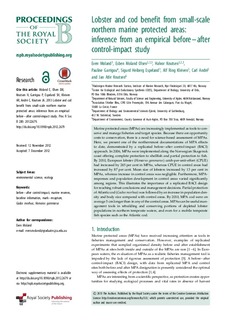| dc.contributor.author | Moland, Even | |
| dc.contributor.author | Olsen, Esben Moland | |
| dc.contributor.author | Knutsen, Halvor | |
| dc.contributor.author | Garrigou, Pauline | |
| dc.contributor.author | Espeland, Sigurd Heiberg | |
| dc.contributor.author | Kleiven, Alf Ring | |
| dc.contributor.author | André, Carl | |
| dc.contributor.author | Knutsen, Jan Atle | |
| dc.date.accessioned | 2013-07-19T12:19:56Z | |
| dc.date.available | 2013-07-19T12:19:56Z | |
| dc.date.issued | 2013 | |
| dc.identifier.citation | Moland, E., Olsen, E.M., Knutsen, H., Garrigou, P., Espeland, S.H., Kleiven, A.R., . . . Knutsen, J.A. (2013). Lobster and cod benefit from small-scale northern marine protected areas: inference from an empirical before - after control-impact study. Proceedings of the Royal Society B-Biological Sciences, 280(1754). doi: 10.1098/rspb.2012.2679 | no_NO |
| dc.identifier.uri | http://hdl.handle.net/11250/138269 | |
| dc.description | Published version of an article from the journal: Proceedings of the Royal Society B-Biological Sciences. Alsop available from the Royal Society: http://dx.doi.org/10.1098/rspb.2012.2679 Open Access | no_NO |
| dc.description.abstract | Marine protected areas (MPAs) are increasingly implemented as tools to conserve and manage fisheries and target species. Because there are opportunity costs to conservation, there is a need for science-based assessment of MPAs. Here, we present one of the northernmost documentations of MPA effects to date, demonstrated by a replicated before-after control-impact (BACI) approach. In 2006, MPAs were implemented along the Norwegian Skagerrak coast offering complete protection to shellfish and partial protection to fish. By 2010, European lobster (Homarus gammarus) catch-per-unit-effort (CPUE) had increased by 245 per cent in MPAs, whereas CPUE in control areas had increased by 87 per cent. Mean size of lobsters increased by 13 per cent in MPAs, whereas increase in control areas was negligible. Furthermore, MPA-responses and population development in control areas varied significantly among regions. This illustrates the importance of a replicated BACI design for reaching robust conclusions and management decisions. Partial protection of Atlantic cod (Gadus morhua) was followed by an increase in population density and body size compared with control areas. By 2010, MPA cod were on average 5 cm longer than in any of the control areas. MPAs can be useful management tools in rebuilding and conserving portions of depleted lobster populations in northern temperate waters, and even for a mobile temperate fish species such as the Atlantic cod. | no_NO |
| dc.language.iso | eng | no_NO |
| dc.publisher | The Royal Society | no_NO |
| dc.title | Lobster and cod benefit from small-scale northern marine protected areas: inference from an empirical before - after control-impact study | no_NO |
| dc.type | Journal article | no_NO |
| dc.type | Peer reviewed | no_NO |
| dc.subject.nsi | VDP::Agriculture and fishery disciplines: 900::Fisheries science: 920::Resource biology: 921 | no_NO |
| dc.subject.nsi | VDP::Mathematics and natural science: 400::Zoology and botany: 480::Marine biology: 497 | no_NO |
| dc.source.pagenumber | 9 p. | no_NO |
| dc.source.volume | 280 | no_NO |
| dc.source.journal | Proceedings of the Royal Society B-Biological Sciences | no_NO |
| dc.identifier.doi | 10.1098/rspb.2012.2679 | |
